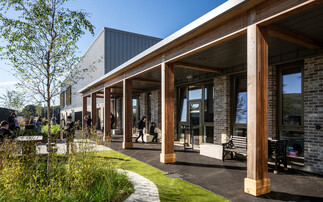More leadership from the private sector is needed to spur action towards delivering sustainable cities by 2030, argues GlobeScan's Stacy Rowland
Cities are hubs for ideas, commerce, culture, and innovation. They are where we live, work, and play - and they are also home to most of the world's population, which is expected to increase over the next few decades. Urban populations are expected to grow and change rapidly, posing significant challenges for affordability, climate change, and the economy.
The Sustainable Development Goals (SDGs) provide the world with a roadmap to a better future. While the initial launch of the Global Goals has captured the imagination of the business community, there is a great deal more awareness and engagement required to build the groundswell needed to meet the 2030 targets.
The 2019 GlobeScan SustainAbility Survey shows that only 14 percent of experts rate the private sector as having made a positive contribution to the SDGs so far. Furthermore, only 10 per cent of experts rate progress on SDG 11 (Sustainable Cities and Communities) as good overall.
More leadership is needed to inform, inspire, and catalyse collective action. The GlobeScan SDG Leadership Series aims to help scale engagement and foster more action across the 17 Global Goals to collectively bring us a step closer to achieving the SDGs.
Each SDG Forum provides the opportunity for experts and opinion leaders from around the world to come together to discuss and collaborate on each SDG in a real-time moderated online discussion.
The SDG Leadership Forum for Goal 11 hosted by TD Bank Group earlier this year, explored best practices for the implementation of green infrastructure in cities, the barriers and solutions to creating inclusive and accessible urban green spaces, as well as potential collaborative opportunities for accelerating progress on SDG 11.
Through green infrastructure and green spaces, the quality of urban living can be enhanced by promoting resilient and sustainable lifestyles for communities. The forum highlighted the significant potential for collaboration and innovation to drive green infrastructure and inclusive green space initiatives, and for helping to create sustainable, liveable cities. Continuing to foster inclusive and diverse dialogue was also highlighted as a way to help build on best practice and scale collaborative efforts.
The responsibility for investment and action on green infrastructure initiatives is largely placed on the public sector. Forum participants felt that this significantly inhibits progress as it limits the potential of green infrastructure to the interests and functions of government. Without meaningful engagement from the private sector and non-governmental organisations, there is insufficient potential for financing, research, and support for green infrastructure projects on a large and replicable scale. A lack of coordinated, partnership-oriented governance over green infrastructure initiatives results in significant barriers to action.
In order to meaningfully transition to urban resiliency through green infrastructure, experts suggested that multi-sectoral engagement and innovation will be required, including participation from government, the private sector, investors, academics, and non-profit organisations. Each actor has a unique contribution to make which can be catalysed through meaningful partnerships and by playing to key organisational strengths.
Forum participants pointed to a recent report published by UMass-Boston Sustainable Solutions Lab that defined effective governance in the era of climate change as: "Requiring the coordinated actions of three types of actors: public agencies, private for-profit enterprises, and private non-profits. Each plays a different role, and each is necessary." This type of coordinated governance is crucial in transitioning to green infrastructure.
With limited urban land availability and high prices, access to land is highly competitive and governments are often outbid by private developers who prefer traditional development opportunities and associated immediate economic returns. Green infrastructure pays off over the longer term, with benefits that are not as easily calculable through traditional tools, such as preventative cost savings and non-economic benefits including quality of life and health. However, the private sector does not often include these preventative savings in ROI calculations and instead implements traditional infrastructure investments that will pay off in the short term, resulting in a significant lack of investment in innovative green infrastructure projects.
While the private sector can provide crucial financing and investment, non-profits can facilitate research and garner public support. Effective implementation of green infrastructure on a large and replicable scale will require a paradigm shift away from a reliance on the public sector and toward meaningful partnerships and engagement with the private sector and non-profits.
Experts identified a variety of innovative opportunities that could be effective in fostering increased private sector investment in green infrastructure. For example, developing public-private partnerships and online platforms to drive green infrastructure investment, funding pilot projects with clear benchmarking to provide proof of concept, and utilising measurement tools such as ecosystem valuation studies and urban indicators to value green spaces.
Additionally, providing regulatory incentives for the private sector on tax relief or green infrastructure credits could also be an opportunity for driving investment in cities, as well as targeting philanthropic contributions toward green infrastructure initiatives through social impact investing.
While there is significant potential for collaboration and innovation to drive progress toward SDG 11, and to develop solutions for some of the most pressing urban issues of our time, advocacy and support for enabling financing and implementing innovations are considered to be the most effective potential actions for the private sector to prioritise in making progress on SDG 11.
Stacy Rowland is director for public relations and communications at GlobeScan







